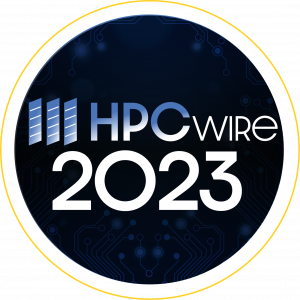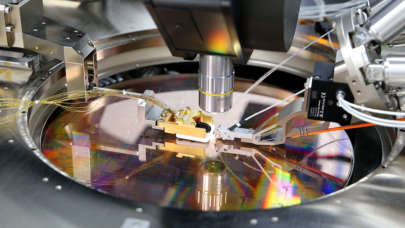DENVER, Nov. 13, 2023 — HPCwire, the leading publication for news and information for the high performance computing industry, announced the winners of the 2023 HPCwire Readers’ and Editors’ Choice Awards at the Supercomputing Conference (SC23) taking place this week in Denver, CO. Tom Tabor, CEO of Tabor Communications, unveiled the list of 108 winners across 22 categories just before the opening gala reception.
 “This year we are celebrating the 20th anniversary of these renowned awards, and the 2023 Readers’ and Editors’ Choice Awards are exceptional, indeed. Throughout the world there are pockets of brilliant scientists working on grand challenge problems that can only be explored and solved because of HPC. Rarely do these accomplishments come to light, much less are they recognized for their achievements and contribution to society,” said Tom Tabor, CEO of Tabor Communications, publishers of HPCwire.
“This year we are celebrating the 20th anniversary of these renowned awards, and the 2023 Readers’ and Editors’ Choice Awards are exceptional, indeed. Throughout the world there are pockets of brilliant scientists working on grand challenge problems that can only be explored and solved because of HPC. Rarely do these accomplishments come to light, much less are they recognized for their achievements and contribution to society,” said Tom Tabor, CEO of Tabor Communications, publishers of HPCwire.
“Between our worldwide readership of HPC experts and the most renowned panel of editors in the industry, the Readers’ and Editors’ Choice Awards represent resounding recognition of the many deep and varied HPC accomplishments throughout the world. Our sincerest gratitude and hearty congratulations go out to all of the winners,” added Tabor.
“Selected by the readers and the editorial team, these awards recognize the technologies, use cases, companies, and leaders that have contributed to the continued growth of the HPC market and community,” said Doug Eadline, Managing Editor, HPCwire. “While there was only one winner in each category, this year we saw a large number of collaborations from around the globe — both the number and quality of submissions were amazing and indicated a vibrant and active Supercomputing community.”
HPCwire has designated two categories of awards: (1) Readers’ Choice, where winners have been elected by HPCwire readers, and (2) Editors’ Choice, where winners have been selected by a panel of HPCwire editors and thought leaders in HPC. The process started with an open nomination process, with voting taking place throughout the month of September.
These awards, now in their 20th year, are widely recognized as being among the most prestigious recognition given by the HPC community to its own each year, and are the only awards that open voting to a worldwide audience of end users.
The 2023 HPCwire Readers’ and Editors’ Choice Award winners are:
Best Use of HPC in Life Sciences
- Readers’ Choice: Scientists from Argonne National Laboratory, the University of Chicago, the Beckman Institute, and the National Center for Supercomputing Applications (NCSA) developed APACE, a computational framework as a service that optimizes AlphaFold2 to run at scale in the Delta supercomputer, reducing time-to-solution for off-the-shelf AlphaFold2 predictions from days to minutes.
- Editors’ Choice: The Structural Biology Department at St. Jude Children’s Research Hospital has developed state-of-the-art computational and machine learning-based methods using a dedicated GPU cluster and DDN file storage to interrogate large-scale biological data from diverse organisms, all in the name of finding cures for pediatric cancer faster.
Best Use of HPC in Physical Sciences
- Readers’ Choice: Using decades of pulsar observations to turn the Milky Way into a galaxy-sized gravitational-wave detector, University of Birmingham researchers conducted numerous simulations using its BlueBEAR (Lenovo, with IntelCPUs and IBM Storage Scale, supplied by OCF Limited) cluster to find strong evidence for the existence of very low-frequency gravitational waves permeating the universe.
- Editors’ Choice: A team of scientists from King Abdullah University of Science and Technology (KAUST) has found through simulations that installing solar panels along the Arabian Red Sea coastal area could warm the land, intensify sea breezes, and generate an additional 1.5 gigatons of rainwater annually‚ enough to provide water for up to 5 million people.
Best HPC Response to Societal Plight
- Readers’ Choice: The National Center for Meteorology of Saudi Arabia (NCMSA) led a team comprised of scientists from University of Connecticut, WeMet P.C. and Lenovo to develop and implement a weather prediction system that handles both precipitation and dust storms. In one case, the system gave one-day advanced warning with highly detailed accuracy, providing time to prepare and reduce fatalities.
- Editors’ Choice: The African Centers of Excellence (ACE) in Bioinformatics and Data-Intensive Science program, in collaboration with NIAID and partners, offers graduate programs in Bioinformatics and HPC infrastructure, empowering scientists to develop new treatments for infectious diseases and to serve as the front line defense against emerging infectious diseases in the African region.
Best Use of HPC in Energy
- Readers’ Choice: Ohio University, Pittsburgh Supercomputing Center, University of Cambridge, University of Oxford, used PSC’s Bridges-2 to run simulations revealing how a coal-like material can be converted to a graphitic form, which is vital for clean energy and other advanced applications, including lithium ion batteries.
- Editors’ Choice: A team of UT Dallas researchers used Texas Advanced Computer Center’s Lonestar5 (Cray), Lonestar6 (Dell), and Stampede2 (Dell, Cray) supercomputers to discover a “recipe” to increase the efficiency of solar cells made from organic materials. The experimental and theoretical investigations led to results that could help reduce the cost of manufacturing organic solar cells and lightweight solar panels.
Best Use of HPC in Industry (Automotive, Aerospace, Manufacturing, Chemical, etc.)
- Readers’ Choice (TIE): GE Aerospace Research and GE Aerospace have pioneered the use of Oak Ridge National Laboratory‘s Frontier, an HPE Cray EX supercomputer. They’re employing computational fluid dynamics simulations to model complex turbulent flow, studying the performance of open fan engine architecture for the next-generation aircraft engine (RISE) potentially cutting CO2 emissions by over 20% and redefining the future of flight.
- Readers’ Choice (TIE): University of Birmingham researchers used its BlueBEAR (Lenovo, with Intel CPUs and IBM Storage Scale, supplied by OCF Limited) supercomputer to analyze manufacturing process data from a novel inline sensor and developed a model that predicts critical quality attributes of the end product, with the aim of reducing waste and improving the sustainability of the pharmaceutical manufacturing processes.
- Editors’ Choice: Working together, the National Energy Technology Laboratory, Pittsburgh Supercomputing Center, and Cerebras Systems accelerated their research on the Rayleigh–Bénard convection problem. They achieved the world’s first fluid flow solution using the Wafer-Scale Engine, promising substantial speed and energy efficiency.
Best Use of High Performance Data Analytics & Artificial Intelligence
- Readers’ Choice: National Center for Atmospheric Research (NCAR) scientists developed a machine learning model to update fuel maps quickly and accurately, providing significant improvements to wildfire forecasts that could aid in evacuation and fire rescue efforts.
- Editors’ Choice: Argonne National Laboratory, the University of Chicago, and the Beckman Institute at the University of Illinois at Urbana-Champaign, and University of Illinois Chicago scientists combined generative AI, high throughput screening methods, and large-scale molecular dynamics simulations (with the LAMMPS code) to assemble, within seconds, novel, stable, and high-capacity metal-organic frameworks for carbon capture.
Best Use of HPC in Financial Services
- Readers’ Choice: G-Research partnered with VAST Data to process massive amounts of data with a platform that supports wide-ranging simulation, machine learning, and analytics workloads to predict and capitalize on market events before they happen.
- Editors’ Choice: Morgan Stanley has leveraged public cloud services from AWS and Azure, reducing on-premises compute usage, to run its Morgan Stanley Risk Calculation Environment (RICE) and deliver compute-intensive risk calculations at an accelerated rate that meets regulatory and business demands in a cost-effective manner.
Best AI Product or Technology
- Readers’ Choice: The AMD Instinct MI250X accelerator
- Editors’ Choice (TIE): GigaIO SuperNODE AI Supercomputer
- Editors’ Choice (TIE): HPE Greenlake for LLM
Best Use of HPC in the Cloud (Use Case)
- Readers’ Choice: San Diego Supercomputer Center at UC San Diego, UC Berkeley, and the University of Washington worked together on CloudBank to enable the use of public cloud resources to deploy UC Berkeley’s educational teaching stack, including a Jupyter hub, to classrooms at community colleges that may not have the local resources to set up and support a similar system.
- Editors’ Choice: The Dana-Farber Cancer Institute developed a computational platform for drug discovery, completing its largest HPC run using 5.7 million Intel-based virtual CPUs running on AWS using the Virtual Flow platform, to identify and create a library of 70B molecules that might be used to treat cancer and other diseases. This publicly available library speeds research safely and effectively by identifying candidates in days versus months.
Best HPC Cloud Platform
- Readers’ Choice: Amazon Web Services
- Editors’ Choice: Microsoft Azure
Best HPC Server Product or Technology
- Readers’ Choice: 4th Gen AMD EPYC CPUs
- Editors’ Choice: Lenovo ThinkSystem SD665-N V3
Best HPC Storage Product or Technology
- Readers’ Choice: The VAST Data Platform
- Editors’ Choice: DDN AI400X2 QLC
Best HPC Programming Tool or Technology
- Readers’ Choice: Intel oneAPI Toolkit software libraries for building, analyzing and scaling HPC and AI applications across shared- and distributed-memory computing systems.
- Editors’ Choice: Spack
Best HPC Interconnect Product or Technology
- Readers’ & Editors’ Choice: Cornelis CN5000 Omni-Path Product Family
Best HPC Collaboration (Academia/Government/Industry)
- Readers’ & Editors’ Choice: Purdue University, Argonne National Laboratory, and Rolls-Royce LibertyWorks, using high-fidelity HPC CFD simulations, collaborated on the design and testing of novel hydrogen-based rotating detonation engine components that, in the future, will have implications for decarbonized power generation.
Top Energy-Efficient HPC Achievement
- Readers’ Choice: The LUMI supercomputer, built by HPE, is one of the greenest supercomputers in the world, using 100% carbon-neutral hydroelectric power and capturing waste heat to power the surrounding city of Kajaani, Finland. That substantially reduces the entire city’s annual carbon footprint by 12,400 tons, an amount that equals the output from nearly 4,000 passenger cars. In addition to being one of the greenest, much of the research being conducted on LUMI is focused on driving new scientific advancements that will allow society to become more sustainable.
- Editors’ Choice: New York City’s Flatiron Institute’s Henri supercomputer took the #1 spot on the Green500 list in November 2022 and repeated as #1 on the May 2023 list. Henri topped the list of the world’s most energy-efficient supercomputers with 65.4 GFLOPS per watt on the May list. Working with Lenovo and NVIDIA, Henri went from shipping to Green500 #1 in six weeks, as the institute was able to obtain some of the first H100 GPUs for the ThinkSystem SR670 V2 servers.
Top HPC-Enabled Scientific Achievement
- Readers’ Choice: For more than a decade, researchers at the University of Cardiff, jointly with colleagues in the LIGO Scientific Collaboration, have developed sophisticated techniques to identify signals buried in the noisy data collected from the LIGO detectors, and to distinguish them from artifacts in the data. New LIGO detectors were recently turned on, leading to the capture of some 30 events in the first three months. Targeting this enhanced sensitivity and the associated analysis, a new purpose-built HPC system installed at University of Cardiff is the result of co-design featuring Cardiff researchers from the School of Physics & Astronomy, ARCCA (Advanced Research Computing at Cardiff) support staff, and Lenovo and Logicalis hardware and software architects.
- Editors’ Choice: Using multiple ACCESS resources (San Diego Supercomputer Center’s Expanse and the National Center for Supercomputing Applications’ Delta), as well as numerous other computational resources, researchers at UC San Diego have been able to accurately model water phases, which has the tremendous potential to impact computational molecular science and could revolutionize our understanding of the molecular world.
Top Supercomputing Achievement
- Readers’ Choice: Barcelona Supercomputing Center (BSC) working with Eviden, ParTec, Lenovo, IBM, Intel, and Nvidia to deliver MareNostrum5, a pre-exascale system.
- Editors’ Choice: GE Aerospace Research and GE Aerospace have pioneered the use of Oak Ridge National Laboratory‘s Frontier, an HPE Cray EX supercomputer. They’re employing computational fluid dynamics simulations to model complex turbulent flow, studying the performance of open fan engine architecture for the next-generation aircraft engine (RISE) potentially cutting CO2 emissions by over 20% and redefining the future of flight.
Top 5 New Products or Technologies to Watch
- Readers’ Choice:
- AMD Instinct MI300 Series
- 4th Gen AMD EPYC Processors with AMD 3D V-Cache Technology
- 4th Gen Intel Xeon Scalable Processors
- Lenovo Neptune Liquid Cooling
- ChatGPT
- Editors’ Choice:
- AMD Instinct MI300 Series
- Ayar Labs In-Package Optical I/O Technology
- GigaIO SuperNODE 32 GPU Server
- Hammerspace
- NVIDIA Grace-Hopper
Top 5 Vendors to Watch
- Readers’ Choice:
- AMD
- AWS
- Google Cloud
- Lenovo
- NVIDIA
- Editors’ Choice:
- AMD
- AWS
- Intel
- Microsoft
- NVIDIA
Workforce Diversity & Inclusion Leadership Award
- Readers’ Choice: The African Centers of Excellence in Internet of Things was created to educate and train African researchers in the field of IoT who will develop and deploy innovative IoT-enabled services to address development challenges across eastern and southern Africa.
- Editors’ Choice: The goal of the CMD-IT/ACM Richard Tapia Celebration of Diversity in Computing Conference is to bring together undergraduate and graduate students, faculty, researchers, and professionals in computing from all backgrounds and ethnicities to celebrate the diversity that exists in computing and connect with others with common backgrounds.
Outstanding Leadership in HPC
Readers’ Choice: William Gropp is Director of the National Center for Supercomputing Applications and holds the Thomas M. Siebel Chair in the Department of Computer Science at the University of Illinois in Urbana-Champaign. His research interests are in parallel computing, software for scientific computing, and numerical methods for partial differential equations.
Editors’ Choice: Anders Dam Jensen has been the Executive Director for the European High Performance Computing Joint Undertaking since September 2020. The appointment is the continuation of a lifelong interest in supercomputers, starting from his time at the Technical University of Denmark, from which he holds a Master of Science Degree and a Master of Business Administration.
More information on these awards can be found at the HPCwire website here and on Twitter through the hashtag: #HPCwireAwards.
About HPCwire
HPCwire is the #1 news and information resource covering the fastest computers in the world and the people who run them. With a legacy of world-class editorial and journalism dating back to 1987, HPCwire is the news source of choice for science, technology and business professionals interested in high performance and data-intensive computing. Visit HPCwire at www.hpcwire.com.
About Tabor Communications Inc.
Tabor Communications Inc. (TCI) is a media and services company dedicated to high-end, performance computing. As publisher of a complete advanced scale computing portfolio that includes HPCwire, Datanami, EnterpriseAI, and HPCwire Japan, TCI is the market-leader in online journalism covering emerging technologies within the high-tech industry, and a services company providing events, audience insights, and other services for companies engaged in performance computing in enterprise, government, and research. More information can be found at www.taborcommunications.com.
Source: Tabor Communications Inc.



























































